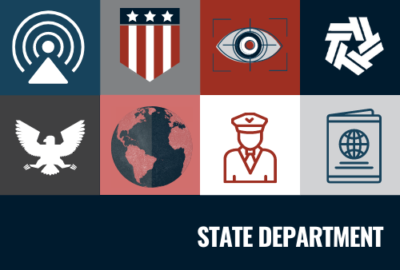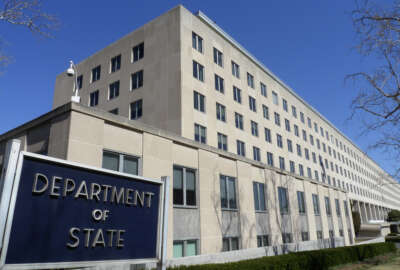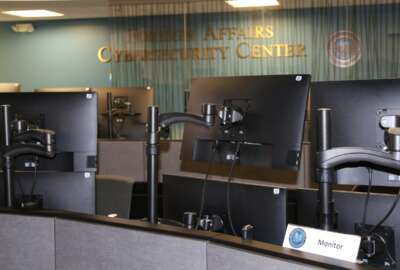

The State Department's Bureau of Cyberspace and Digital Policy is on a mission to give diplomats across the world greater access to experts in emerging technology.
The State Department’s Bureau of Cyberspace and Digital Policy is on a mission to give diplomats across the world greater access to experts in emerging technology.
Ambassador at Large for Cyberspace and Digital Policy Nathaniel Fick told reporters Wednesday that the bureau plans to put a trained cyber and digital officer in every embassy around the world by the end of next year.
“We’ll have somebody in every embassy globally who has some basic training and understanding of these issues,” Fick said at a Defense Writers Group event.
In an effort to elevate these skills across the diplomatic workforce, the Foreign Service this week created a new skill code for personnel who work on cyber, digital and emerging tech issues.
“What it means is if a Foreign Service officer spends a couple of years in a designated technology tour, he or she gets credit for that in their record. That’s the first step towards incentivizing people to seek out these jobs,” Fick said.
In addition to the Foreign Service recognizing diplomats for prior work in cybersecurity and emerging technology, the skill code will eventually allow the department to have a better headcount of personnel with these in-demand skills.
Fick said the new skill code also demonstrates the cross-cutting role cybersecurity and emerging tech have in other policy areas, and could potentially serve as a core competency for many senior leadership roles.
“I can imagine a future where every credible candidate to be a chief of mission, every future U.S. ambassador anywhere in the world, has to have some demonstrated understanding of technology issues, and a willingness to engage on that,” he said. “You can’t practice East Asian diplomacy without tech diplomacy, you can’t do human rights work without tech, you can’t do climate diplomacy without tech. So we have to infuse that into the culture of the place and reward people for working on it.”
The bureau, a year after its creation, has about 115 personnel, and is looking to make about 30 additional hires. The bureau, under the latest National Defense Authorization Act, has the ability to make 25 excepted civil service hires.
Fick said that expedited hiring authority allows the bureau to make “an end-run around a lot of the bureaucracy of the hiring process,” in order to bring in top talent from the private sector.
“We need people with technology experience and expertise, but also people with commercial sensibility,” Fick said. “You need to go sit with companies and develop joint plans and not be viewed as the fed. You’ve got to be able to sit down and actually have that discussion and understand what works and what doesn’t work in a commercial context. That excepted hiring authority is a huge advantage in that regard.”
The department’s Foreign Service Institute now offers a course in cyber and digital policy. Fick said that FSI has been oversubscribed with personnel taking the course, and expects similar interest in future courses offered both in London and Arlington, Virginia.
Fick said he’s focused on elevating these cyber and emerging tech skills across the career workforce.
“I’m a short-timer, as any political appointee is. That’s just the nature of the world, and the only way this thing succeeds is if we can create the culture and the incentives inside the career Foreign Service and civil service, that make sure that the work is viewed as important and rewarding over the long haul,” he said.
Beyond increasing the State Department’s capacity to address these emerging policy issues, the bureau is also looking to set international norms and standards around emerging technology and to help allies defend against cyber threats.
To support that mission, the bureau is calling on Congress to create an “assistance fund” that would allow the department to support cyber, digital and emerging tech projects with allied nations.
“The basic need here is a dedicated mechanism that can move quickly enough to be useful, given the pace of cyber threat actors, and our current assistance mechanism is set up to do other things,” Fick said. “It’s not architected to move at this pace, it doesn’t have the kind of flexibility that you need to address cyber issues.”
The proposed fund would operate differently than most of the international aid the State Department controls, since most of that funding isn’t able to support another nation’s military or law enforcement organizations.
“That’s a challenge in the cybersecurity space, when those are exactly the organizations that own those capabilities in partner countries where we may want to go help out,” Fick said.
Fick said the department is currently engaging in a “two-way conversation” on pending legislation with lawmakers.
In addition to providing financial support, Fick said the State Department also needs to think more broadly about how it can render aid to allied nations looking to stay ahead of emerging tech threats.
“We need to think a little bit more holistically about what assistance means. It’s dollars, it’s software, it’s capacity building for training people,” he said.
The bureau can also lend the federal government’s expertise in setting international standards and norms on the use of emerging technology.
“We should be and we are now providing those kinds of templates to our partners, so they don’t have to reinvent the wheel. Yeah, they have to tailor it for their unique circumstance, of course … Let’s save them the challenge of writing the first draft and provide ours that they can then edit,” Fick said.
Fick said he met last week with the director of the National Institute of Standards and Technology (NIST), and said both agencies should “stand shoulder-to-shoulder in the development and the promulgation of standards across all of these technology areas.”
“American leadership matters. People around the world are looking for the U.S. to do the spadework to develop the standards that have the philosophical grounding in the buzzwords of open, interoperable, reliable [and] secure. Frankly, it’s across every technology area,” Fick said.
The bureau is making artificial intelligence a priority area for setting international norms.
“Early advantage compounds and becomes more unassailable — and early disadvantage compounds and it can become impossible to close the gap,” Fick said. “It makes it essential that we establish norms and standards that we’re going to be willing to live by when the technology is more proliferated in the world.”
The White House released its Blueprint for a “Bill of Rights” late last year. The Defense Department and intelligence community have also set out policies on the ethical use of AI.
“We’re not starting from zero, there’s a lot there. I would say the challenge is more one of harmonization. There are a lot of disparate efforts. How do you pull them together in a way that is going to be both broad and inclusive, and also effective?” Fick said.
Meanwhile, the bureau is also working on an international cybersecurity and digital policy strategy mandated under the NDAA.
“Throughout the creation [and] the drafting of the National Cybersecurity Strategy, we had always thought about that fifth pillar — the international pillar, as kind of like an API we would plug a more robust international strategy into. So that’s now what we’re doing,” Fick said.
Copyright © 2025 Federal News Network. All rights reserved. This website is not intended for users located within the European Economic Area.
Jory Heckman is a reporter at Federal News Network covering U.S. Postal Service, IRS, big data and technology issues.
Follow @jheckmanWFED


 Exclusive
Exclusive 